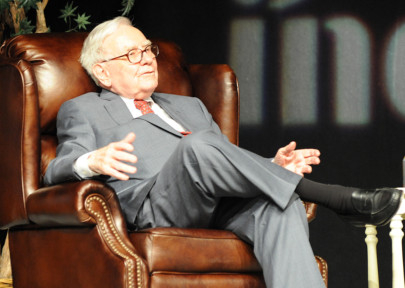
As the second-richest person on the planet, Warren Buffett has inspired scores of investors thanks to a track record that has earned him billions of dollars over the years. Called the Oracle of Omaha, the 83-year-old has a net worth of $63.4 billion (about Dh233 billion), according to the Bloomberg Billionaires Index.
His annual letter to investors contains investment gems eagerly followed by professionals and amateurs around the world. This year’s letter is important for its advice to his wife’s trustees, who have been compared to non-professional investors.
Here are three observations from his 2014 note.
Invest in index funds
On the event of his death, Buffett says, “My advice to the trustee could not be more simple: Put 10 per cent of the cash in short-term government bonds and 90 per cent in a very low-cost Standard & Poor’s 500 index fund.”
Index funds aim to replicate the movements of a financial market index. Buffett suggests the low-cost Vanguard fund, which he believes will provide long-term results superior to those attained by funds employing high-fee managers. He has offered this advice before —index funds are cheaper and provide better returns than managed funds.
Take advantage of dollar-cost averaging
Buffett recommends dollar-cost averaging in the index fund — or in shares — a little at a time. The term refers to a minimal-risk investment strategy of purchasing securities at predetermined intervals and set amounts. This spreads out the cost basis over several years, providing insulation against market volatility.
“The main danger is that the timid or beginning investor will enter the market at a time of extreme exuberance and then become disillusioned when paper losses occur,” Buffett says. “Remember the late Barton Biggs’ observation, ‘A bull market is like sex. It feels best just before it ends.’
“The antidote to that kind of mistiming is for an investor to accumulate shares over a long period and never sell when the news is bad and stocks are well off their highs.
“The know-nothing investor who both diversifies and keeps his costs minimal is virtually certain to get satisfactory results. Indeed, the unsophisticated investor who is realistic about his shortcomings is likely to obtain better long-term results than the knowledgeable professional who is blind to even a single weakness.”
Property pays off over the long term
Buffett writes about two very different property investments he made — a farm in Nebraska, which he bought in 1986 and is now worth five times its original price, and a retail property next to New York University (NYU), which he bought with friends and whose annual distributions now exceed 35 per cent of the initial equity investment.
Both investments have paid for themselves since he bought them, but Buffett does not want to liquidate them. “Income from both the farm and the NYU real estate will probably increase in decades to come. Although the gains won’t be dramatic, the two investments will be solid and satisfactory holdings for my lifetime and, subsequently, for my children and grandchildren,” he says.
Real estate, in this view, is a storehouse of value.










